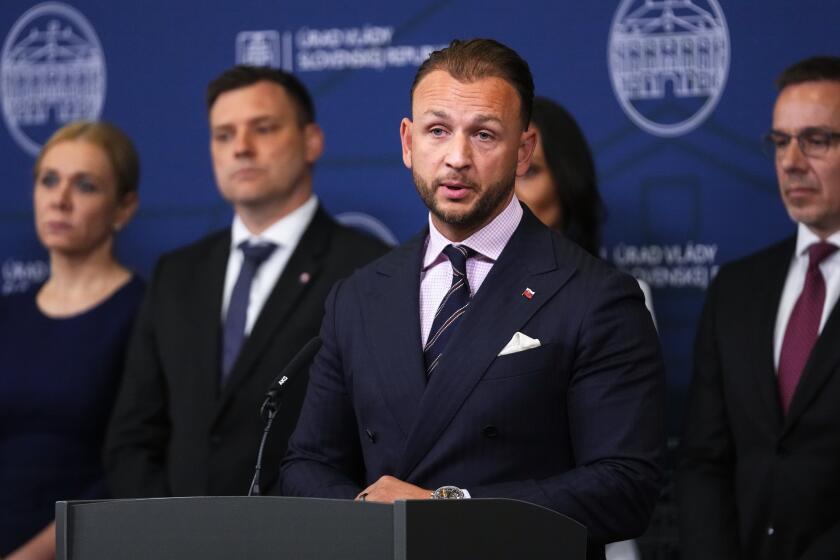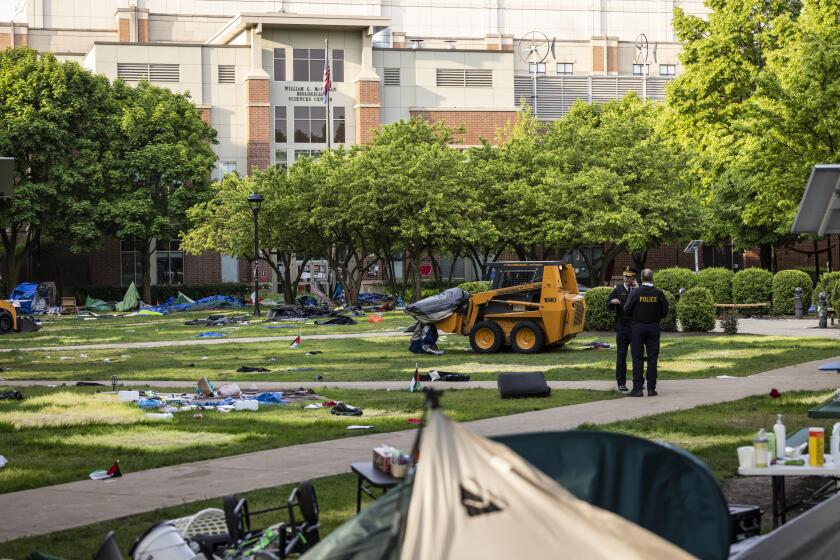Muscovites Do a Slow Burn When Putin Speeds Through
Most days, traffic creeps through the streets of central Moscow at an average pace of 6 mph. But one commuter rips through at speeds topping 85 mph: President Vladimir V. Putin.
Judging by radio talk shows and newspaper stories, frustration with Putin’s motorcades is on the rise in the ever-more-congested Russian capital. Muscovites are not just angry that Putin’s presidential privileges let him escape the snarl, they are also convinced that the president increasingly is causing it.
“When Putin is on the road, nobody else moves,” says Tatyana Ivanova, 37, who drives a trolley bus along the president’s route. “All cars are ordered to stand still. It’s no wonder that this paralyzes the city for hours.”
Ivanova blames tight security around Putin. She notes that under his predecessor, Boris N. Yeltsin, other vehicles along the presidential route were moved to the side of the road and sometimes permitted to keep moving slowly while the president raced down the center.
Under Putin, traffic police block all vehicles from entering the roads along the route. They wait for the cars already on the roadway to clear; sometimes they even shoo away pedestrians. Then the motorcade blazes through at speeds above 85 mph, which, experts say, is the speed at which snipers have trouble holding a target. Police usually wait a few minutes before permitting traffic to move again. Sometimes the procedure takes only about 15 minutes, but it has been known to take 40 minutes or longer.
“The president must be scared to death of his people if he drives like that,” says Ivanova’s colleague, Alla Kuzmina, a 28-year-old dispatcher. “It should not be this way. At least it was not like that in the past.”
Some commentators say the fundamental problem is not Putin’s security but the sheer number of cars on Moscow’s streets, which even by official figures has more than tripled in the last decade.
“They shut down the streets the same way for [Soviet leader Leonid I.] Brezhnev, but there were 10 or 20 times fewer cars on the roads, and we didn’t get the kind of traffic jams we have now,” says Alexander Gordon, morning host on Serebryanny Dozhd radio, where the motorcades are a favorite target of caller complaints. “Now, if they shut the streets for 20 or 30 minutes, the number of cars they stop is many times greater and, of course, the traffic jams are much, much worse.”
Whether security or traffic is more to blame may be beside the point, because the two are trapped in a vicious cycle: The more traffic, the more security. The more security, the more traffic.
Ironically, many of the things voters liked about Putin, who was elected in March, are some of the same things that make him a traffic hazard. Unlike Yeltsin, Putin actually goes to work in the Kremlin each day. He has many more appointments on a daily basis and makes many more appearances. And he travels out of the capital several times a month, tying up traffic to and from the airport.
Gordon notes that there are two elegant ways out of the problem. The first would be for suburbanite Putin to live where he works, like the U.S. president. And indeed, there is a presidential apartment in the Kremlin. The second solution would be to use a helicopter.
It’s not clear whether the president has considered these solutions; Kremlin spokesmen refuse to discuss the issue. But like many Muscovites, Ivanova suspects that Putin enjoys such trappings of presidential power. And that’s ironic, because voters praised him during the campaign for his modesty.
“There are countries where presidents and prime ministers ride to work on a bicycle,” the trolley driver says. “Russia is not one of them.”
Despite all the complaints, Gordon suspects that Moscow drivers will put up with it. “And you know why?” he asks. “Because they know that if they were in his position, they would do the exact same thing.”
*
Alexei V. Kuznetsov of The Times’ Moscow Bureau contributed to this report.
More to Read
Start your day right
Sign up for Essential California for news, features and recommendations from the L.A. Times and beyond in your inbox six days a week.
You may occasionally receive promotional content from the Los Angeles Times.






